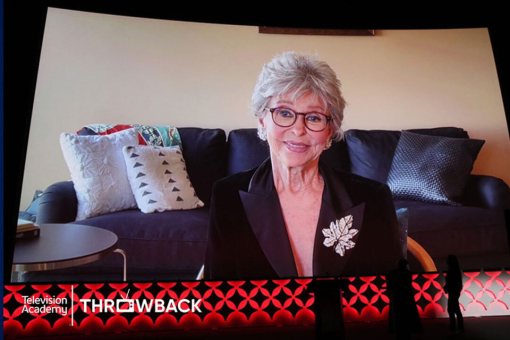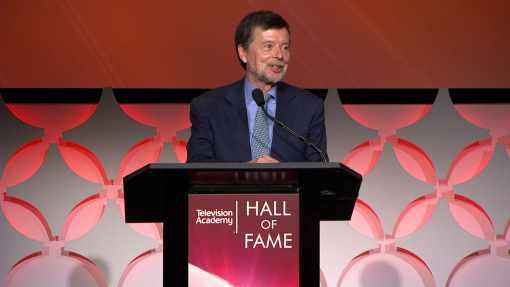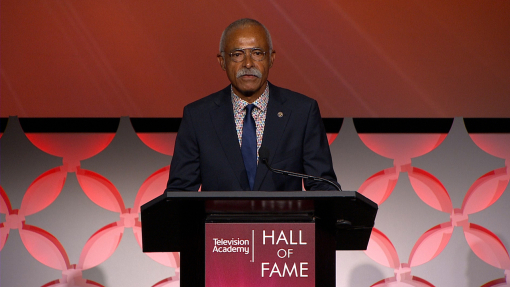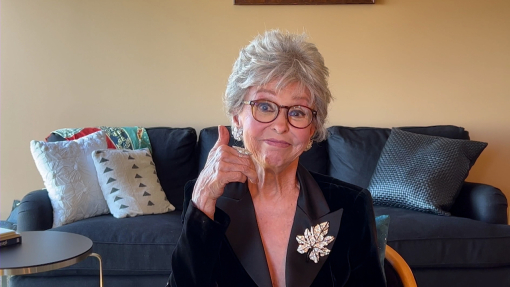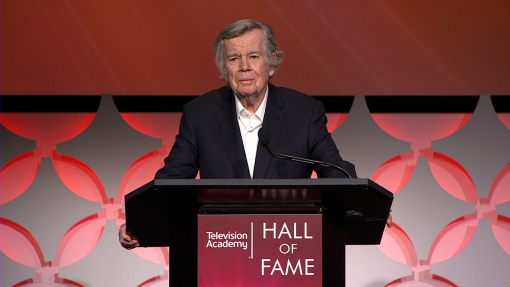“I may have been eight or nine years old when I first decided that broadcast journalism was what I wanted to go into,” recalls Ted Koppel, now anchoring his 12th year of ABC News Nightline and the winner of 18 Emmys, three Peabody Awards, eight duPont-Columbia Awards and dozens of other honors. “My dad and I used to listen to rebroadcasts of Ed Murrow on the BBC when I was growing up in London, and I remember thinking, ‘What a great way to make a living.’ There has never been any doubt in my mind as to what I wanted to do.”
Roone Arledge, president of ABC News, says, “Ted belongs in the Hall of Fame because he and all the people who work with him took a time period in which people were not supposed to be interested in anything serious and managed to create a serious program that has not only survived, but flourished. That’s extraordinary. You can’t separate Ted from Nightline.”
Koppel came to the United States from his native England in 1953 at the age of 13 and earned a master’s degree in mass-communications, research, and political science from Stanford University after graduating from Syracuse University.
“When I came out of graduate school,” Koppel remembers, “I had a very hard time finding a job in broadcasting. My wife and I papered a wall of our den with all the rejection letters. I’m kind of sorry I don’t have that wall anymore. But I wasn’t terribly discouraged; I knew that if someone gave me a chance to work in radio, I’d be able to prove my worth.”
Finally, New York radio station WMCA hired Koppel for off-air assignments in 1962, and the next year he joined ABC Radio’s Flair Reports as an on-air commentator.
Three years later, Koppel volunteered to report from Vietnam for ABC Radio and instead received an assignment from ABC Television, for the same destination.
“What I didn’t tell them, although they should have known it,” Koppel admits, “was that I had absolutely no experience in television.”
He returned to the United States in 1968 to become the chief of ABC’s Miami bureau and the network’s principal correspondent for Richard Nixon’s presidential campaign.
Koppel remembers, “I thought that [with Nixon’s victory] I would cover the White House. But Bill Sheehan, executive vice president of ABC News, said, ‘You’re just too young. We can’t have a 28-year-old White House correspondent.’
Following two years as the network’s Hong Kong Bureau Chief, Koppel became ABC’s chief diplomatic correspondent in 1971, a position he says helped prepare him to anchor Nightline.
“People in diplomacy place a very high premium on language,” Koppel says, “and they’re very specific in the kind of language they use. The change of a single word can be enough to change the meaning of an entire state document. They combine a lawyerly precision with the love of language that only a diplomat has. I credit my association with those diplomats at the State Department — most particularly covering Henry Kissinger — with teaching me how to listen. I also learned how to learn quickly.”
Koppel’s anchoring of Nightline was born out of the 1979-1980 Iran-hostage crisis and ABC News’s desire for a one-hour nightly newscast.
“My job as chief diplomatic correspondent and anchor of Nightline overlapped,” Koppel recalls. “Before Nightline there was a series of late-night specials called America Held Hostage. Frank Reynolds was the anchor of the evening news and America Held Hostage, which I appeared on every night because I was chief diplomatic correspondent. After about three weeks, Frank wanted a day off because he had been working 16-hour days and I sat in for him. When the [presidential] primary season started in January 1980 and Frank went up to New Hampshire, I did them all the time. On March 20th we began Nightline.”
Arledge says, “Ted has made Nightline work because of his very special qualities. He’s blessed with a great voice and a presence that’s very pleasing, particularly at that hour. His curiosity and his intellect are his most important attributes, as well as his ability to listen in a chaotic situation. I love watching Ted’s mind work on Nightline.
“There’s a quality that great interviewers have — and Ted is one of them — that is the same at dinner as it is on the air: Asking questions that make people say things they wouldn’t normally say, the kinds of questions that make them wonder later, ‘Why the hell did I say that?’ Ted’s ability to do that comes from his demeanor and ability to provoke people to answer things.”
Barbara Walters, who occasionally substitutes for Koppel on Nightline, says, “Ted is a superb interviewer. Very direct. No baloney. He’s fearless and has the ability to ask very tough questions without being rude or condescending. Ted is more his own person than almost anybody I know. I think he even negotiates his own contracts. He has tremendous guts and a very quiet self-confidence. Also, it’s his own hair.”
Sam Donaldson credits Koppel’s motivation as one of the keys to his success. “When Ted and I got into broadcast news in the 1960s you couldn’t make any money,” Donaldson observes. “Teddy wanted to succeed, but he wasn’t in it for the money. He was in it because he loved news. Ted knows how to develop a theme better than anybody else in the business. He asks questions that go beyond daily headline-news gathering. Fortunately, he has the format, the talent and the intellect that allow him to do that. In a golden sense, Ted is one of those individuals who has had a confluence of talent and program. It was a match made in heaven.”
After more than 3,000 programs, Koppel chooses several recent hour-long specials among his favorites. “I’m very proud of the investigative reports we’ve put together over the past 18 months, particularly on the rearming of Iraq, and extremely proud of the shows we did recently on Los Angeles. Nightline is different from other magazine shows on television in that most of them are taped and edited. Nightline focuses daily on one subject, is live and goes out five days a week. That is a huge difference.”
Koppel has no pretensions about being an expert on every subject that airs on Nightline — from baseball to Somalia — and he believes that on many nights he is being educated along with his audience.
“One of the things that makes me proudest of Nightline as a broadcaster,” Koppel says, “is that when it is functioning at its best, it really does act as a national classroom. Television is a mass medium, and that means that by definition it is never going to be terribly profound. But there will always be a place for a program like Nightline that focuses on one of the important issues of the day and tries to peel away a couple of the layers. That is something worth continuing. It’s a program that should stay on for several generations to come.”
This tribute originally appeared in the Television Academy Hall of Fame program celebrating Ted Koppel's induction in 1992.

